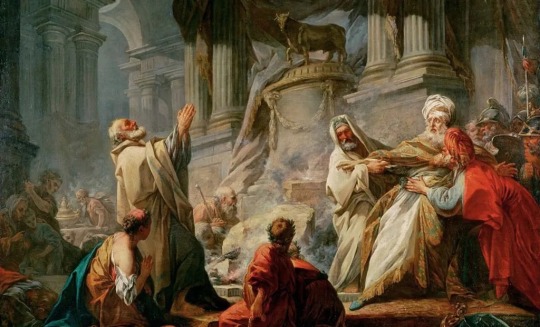#MissionAssist 2023
Text

Sanctified by Truth
On their behalf I give myself to you, so that I belong completely to you. Then they also can completely belong to you, as they follow the truth.’
— John 17:19 | EasyEnglish Bible 2018 (EEB)
EasyEnglish Bible © MissionAssist 2023, translated by the EasyEnglish Bible Translation Team.
Cross References: John 15:3; JOhn 15:13; John 17:20; 2 Corinthians 7:14; Colossians 1:6; Hebrews 10:10; 1 John 3:3
#sanctification#truth#disciples#prayer#John 17:19#Gospel of John#New Testament#EEB#EasyEnglish Bible#MissionAssist 2023
7 notes
·
View notes
Text

Isaiah's Message of Deliverance
1 When King Hezekiah heard the report of his officers, he tore his clothes. Then he put on rough sackcloth and he went into the Lord's temple. 2 He sent Eliakim, Shebna and the leaders of the priests to Amoz's son, Isaiah the prophet. Eliakim was the most important officer in the king's palace. Shebna was a government officer. They were all wearing sackcloth. 3 They told Hezekiah's message to Isaiah:
‘This is a time of great trouble. Assyria has insulted us to make us ashamed. Our nation is like a woman who is ready to give birth, but she is too weak to push the child out. 4 The Assyrian officer has brought a message from his king to insult the God who lives for ever. Maybe the Lord your God has heard that message. He should punish the officer for his wicked message. So please pray for the people who remain in Jerusalem.’
5 When King Hezekiah's officers told their message to Isaiah, 6 Isaiah said to them, ‘Tell your master that the Lord says this: “Do not let the words that you have heard make you afraid. The servants of the king of Assyria have insulted me, the Lord. 7 Listen to me! I will put a spirit into the king of Assyria's mind. He will hear a report which will cause him to return to his own country. There, in his own land, I will cause someone to kill him with a sword.” ’
8 At that time, the king of Assyria had left Lachish city. When the Assyrian officer heard that news, he left Jerusalem. He went to meet the king at Libnah, where the king was now fighting a battle. 9 Then the king of Assyria heard a report about Tirhakah, the king of Ethiopia. People told him, ‘He has brought his army from Ethiopia to fight against you.’
When the king of Assyria heard that news, he sent another message to Hezekiah in Jerusalem. 10 This was his message to King Hezekiah of Judah: ‘You are hoping that your God will help you. Your God may say that the king of Assyria will not destroy Jerusalem. But do not let him deceive you. 11 You have heard how the kings of Assyria have completely destroyed all other countries. So do not think that your God will rescue you. 12 The gods of those other countries did not save them. Our kings destroyed the nations of Gozan, Haran and Rezeph. They killed the people of Eden who lived in Tel Assar. 13 The kings of Hamath and Arpad have gone. The king of Sepharvaim city has gone. The kings of Hena and Ivvah have also gone.’
14 When Hezekiah received the letter with this message, he read it. Then he went up to the Lord's temple. He put the letter there, in front of the Lord. 15 Hezekiah prayed to the Lord. He said:
16 ‘Lord Almighty, you are Israel's God. You sit on your throne between the cherubs. Only you are the God who rules all the kingdoms in the world. You have made the heavens and the earth. 17 Lord, please listen carefully to me. Lord, look carefully at this letter. Listen to Sennacherib's message. He is insulting you, the God who lives for ever. 18 It is true, Lord, that the kings of Assyria have destroyed all these people and their lands. 19 They threw the gods of these nations into the fire. Those idols are not really gods. People used wood and stone to make them. So the Assyrians could destroy them. 20 So now, Lord, you are our God! Save us from the power of Sennacherib! Then all the kingdoms in the world will know that you alone are the Lord.’
God answers Hezekiah
21 Then Amoz's son, Isaiah, sent this message to Hezekiah: ‘The Lord, Israel's God, says, “You have prayed to me about Sennacherib, the king of Assyria.” 22 This is the Lord's reply. The Lord says this about King Sennacherib:
“The holy people of Zion laugh at you!
They think that you are useless.
Yes, the people of Jerusalem shake their heads
as you run away.
23 Who do you think it is that you have insulted?
Who have you shouted at?
Who have you looked at so proudly?
The answer is the Holy God of Israel!
24 You have sent your servants
to insult the Lord God.
You have said, ‘I have taken all my chariots
and I have gone up high mountains,
the highest mountains in Lebanon.
I have cut down its tall cedar trees,
and I have cut down its best pine trees.
I went up to its highest places,
and I went far into its forests.
25 I dug wells and they gave me water to drink.
My army marched through all the rivers in Egypt,
and the rivers became dry.’
26 You said that, but now listen to this!
You must surely have heard it already.
I decided what to do a long time ago!
Now I am causing it to happen.
I decided that you would destroy strong cities
so that they became heaps of stones.
27 The people of those cities have no power.
They are afraid and they are confused.
They are like plants in a field,
that cannot live for a long time.
They are like fresh green grass,
or grass that grows on the roof of a house.
When a hot wind blows on them,
it burns them and they die.
28 I know everything about you.
I know where you live.
I know when you go out.
And I know when you return home.
I know how much you shout against me,
when you are angry.
29 Yes, you do shout at me!
And I have heard all your proud noise.
So I will put my hook in your nose.
I will tie a rope to your mouth.
Then I will pull you back home
by the same way that you came.”
30 King Hezekiah, this is how you will know that I have spoken a true message from the Lord. This year, you will eat crops that grow by themselves. And next year you will eat what grows from the same seeds. But in the third year you will plant seeds for yourselves, and they will give you a harvest of crops. You will plant vines again and you will eat grapes from them. 31 The people who remain in Judah will be like strong plants that put their roots down into the ground. Their branches will give lots of fruit.
32 A small number of people will still be alive in Jerusalem. They will leave Mount Zion and they will go to other places. The great love that the Lord Almighty has for his people will cause that to happen!
33 This is what the Lord says about the king of Assyria:
“His army will not come into this city.
His soldiers will not shoot any arrows here.
They will not attack the city as they hold their shields.
They will not build heaps of earth against the city's walls.
34 No! The king will return home by the way that he came.
He will not come into this city.”
That is what the Lord says.
35 “I will make this city safe and I will rescue it.
I will do that to show that I am great.
I promised my servant David that I would do it.
So I will do it.” ’
The Lord destroys Assyria's army
36 Then the Lord's angel went to the camp of the Assyrian army. He killed 185,000 of their soldiers. When people got up in the morning, they saw all those dead bodies! 37 So King Sennacherib of Assyria took his army away. He returned to Assyria and he lived in Nineveh.
38 One day, Sennacherib was worshipping his god Nisrok, in Nisrok's temple. Two of Sennacherib's sons, Adrammelech and Sharezer, went in and they killed him with their swords. Then they ran away to the region of Ararat. Sennacherib's son, Esarhaddon, now ruled Assyria as king.
— Isaiah 37 | EasyEnglish Bible 2018 (EEB)
EasyEnglish Bible © MissionAssist 2023, translated by the EasyEnglish Bible Translation Team.
Cross References: Genesis 8:4; Genesis 10:11; Exodus 25:22; Leviticus 25:5; Numbers 33:20; Deuteronomy 11:10; 1 Samuel 7:8; 1 Samuel 17:46; 1 Samuel 29:6; 2 Kings 15:29; 2 Kings 18:13; 2 Kings 18:34; 2 Kings 19:1; 2 Kings 19:14,15 and 16; 2 Kings 19:21; 2 Kings 19:31; 2 Kings 19:35; 2 Kings 20:6; Job 41:2; Psalm 92:14; Isaiah 1:1; Isaiah 2:11; Isaiah 7:4; Isaiah 10:9; Isaiah 10:13; Isaiah 14:32; Isaiah 22:5; Isaiah 31:8; Isaiah 36:14-15; Matthew 10:27; Luke 19:43; Acts 2:23; Acts 7:2; Galatians 4:8
#Sennacherib's blasphemous letter#Hezekiah's prayer#Isaiah's message of deliverance#Sennacherib's downfall prophesied#Jerusalem delivered#Isaiah 37#Book of Isaiah#Old Testament#EEB#EasyEnglish Bible 2018#MissionAssist 2023
6 notes
·
View notes
Text
Devotional Hours Within the Bible

by J.R. Miller
Jeroboam's Idolatry (1 Kings 12)
Jeroboam had a fine opportunity. He had come up from the ranks of the people through his own industry and efficiency. He was among the workmen engaged on the great public works of the nation when Solomon found him, his attention having been drawn to him by his industry and ability. He had risen, not through political influence but by sheer worth to a high place. Then he had been divinely pointed out as the man to be the king of the ten northern revolting tribes. The prophet had told him that the Lord would give him this responsible place. The people had also freely turned to him and chosen him as their leader. He had the gifts and qualifications for kingship. If only he had used his opportunity aright he might have become a great king and have built up a mighty empire.
But there was a condition, as there always is when God puts a trust into any man’s hands. “I will place you on the throne of Israel, and you will rule over all that your heart desires. If you listen to what I tell you and follow my ways and do whatever I consider to be right, and if you obey my laws and commands, as my servant David did, then I will always be with you. I will establish an enduring dynasty for you as I did for David, and I will give Israel to you.” But Jeroboam threw away this magnificent opportunity, and wrecked the possibilities of his own life. He might have made a brilliant story of honor and blessing for himself and the new kingdom if he had been faithful to God.
Jeroboam was a good builder. Building had been his business. When he became king, he set to work at once to build and fortify cities. “Jeroboam built Shechem. .. and built Penuel.” What a pity it is that he did not stay at his building work all his life! We cannot help thinking how different the history of God’s people might have been if Jeroboam had not become king; or if, being king by divine appointment, he had walked in God’s ways.
A trail of sin, however, blotted every page of the nation’s story behind him. He is known as “the man who made Israel to sin.” Every time his name is mentioned, this mark of dishonor is attached to it. He was put upon his throne with a holy mission. He was called to be a godly king, and then was promised honor, divine blessing, and the perpetuity of his throne. But he proved a traitor to God, and failed to carry out the divine plan for his life. He not only wrecked his own destiny but he dragged a nation with him, down to sin and infamy. It seems a pity that he was ever discovered by Solomon and promoted to a place of honor. Better if he had remained all his life in his lowly place. He understood building cities and strengthening fortifications; had he only built morally and spiritually as well as he had built in material things, he would have been a successful king. There are many people who do this world’s part of their life-work well enough but fail utterly of their higher mission.
We must do our common work conscientiously. We are sure that Jesus was a good carpenter and did the work of His trade most honestly and carefully. But He had a higher mission than carpentering. There are fine carpenters, who are neglectful of their spiritual duties. No life is a success which does not build for heaven. Bricks and stones and timbers will not make eternal habitations. It is right to do one’s work well but if one’s work on the heavenly side is neglected meanwhile, the result will be disastrous in the end. The record of Jeroboam’s enterprise, is all eclipsed by the black spots of his great moral failure.
Jeroboam wanted to keep his people loyal and faithful to him, and set about devising ways of encouraging such loyalty and devotion. He thought he saw danger in the people’s returning to the feasts in Jerusalem. He feared that if this were still permitted, that they would be drawn back to their former allegiance to the southern kingdom of Judah. He knew that they would not be satisfied without some system of worship. They had been accustomed to go to Jerusalem to the great feasts, and these observances had a tremendous hold upon them. If they had no place of worship of their own, they would continue to go to the temple and would gradually drift back to Judah. “Jeroboam said in his heart. Now. .. if this people go up to offer sacrifices in the house of Jehovah at Jerusalem, then will the heart of this people turn again unto the Lord.”
It is true that old religious faiths die hard. Religious ties are very strong. When bred in the blood and fiber, it is almost impossible to break them. Those who have been brought up with strong religious habits from their infancy can scarcely by any power be turned entirely away from these habits in later life. This is one reason why children should be trained from the cradle to obey God, and engage in His service. They may then for a time be drawn away from good paths by the world’s temptations but they will almost surely come back in the end. Jeroboam was right in his impression that the people would be apt to drift back to the old altars, unless he provided something in place of what they had left. Yet this was no justification for the sin into which he led them. If he had been loyal to God he would have sought the counsel of some wise and godly men, and have devised some plan to provide for his people religious worship, which would have the divine approval.
The king’s device to meet the danger was not God’s way. “The king made two gold calves. He said to the people, ‘It is too much trouble for you to worship in Jerusalem. O Israel, these are the gods who brought you out of Egypt!’ He placed these calf idols at the southern and northern ends of Israel in Bethel and in Dan. This became a great sin for the people worshiped them!”
Nature abhors a vacuum. A human heart cannot be left empty. “When one object of devotion is taken from it, something else must be put in its place. The king knew that the only way he could keep the people from returning to the old worship was by furnishing some other worship for them. So he was not content to forbid them going up to the old national feasts; he set up new shrines and appointed new festivals.
The old missionaries understood this law of life. When cutting down the sacred groves where the people had worshiped idols, they used the wood to erect Christian chapels on the same spot. If we seek to drive out evil we must do it by getting something good into the heart instead. There is little use in merely urging people to stop doing wrong they must be taught to do something in place of the wrong, and unless they are given something good to do they will continue to do the wrong things.
But while Jeroboam took advantage of this law of life, he erred grievously in the way he sought to fill the vacuum. Turning the people away from the worship of the true God he set up idols and taught them to worship these! Only evil came out of it. “This became a great sin, for the people worshiped them, traveling even as far as Dan!” The king’s plan worked well, according to his purpose. The people took readily to his new shrines. They went even to the farthest off, to Dan, to worship. They do not seem to have had any desire to return to Jerusalem. So Jeroboam had a religion of his own for his new kingdom, and thus one of the strongest ties of the old national life, was broken and the separation was made complete.
Yet this is one of the saddest records in the Bible. It tells of the beginning of a departure from God, which in the end brought bitter sorrow and terrible ruin upon the people, blotting from the very face of the earth the tribes who were thus set going on a wrong path! The man who starts an error never knows to what it will grow. He who sets another’s feet in a wrong path never knows where it will lead at last. To teach one child falsely may be to hurt thousands of lives in the end. Those who start new enterprises open fountains of influence, good or bad, which will flow on forever. Jeroboam gave shape and character to the new departure, and the nineteen kings who followed him all, with not on exception, walked in his evil steps!
There is an old story of an abbot who coveted a certain piece of ground. The owner refused to sell but consented to lease it for one crop only. The shrewd abbot sowed acorns, a crop of which would take three hundred years to grow and ripen. Jeroboam’s one evil sowing, mortgaged the new kingdom for evil through all its two hundred and fifty years of history!
Jeroboam’s evil work did not stop with the setting up of the calves of gold. He established a full religious cult and elaborated a complete system of worship. He made priests, and ordained feasts and systems of sacrifice.
We may trace the course of this man’s sin as it works itself out in the after history. What were the consequences in Jeroboam himself? Trouble followed trouble. His hand withered at the altar. His child died. He was defeated in war. His kingdom was partially torn from him. He was smitten in his person and went to his grave in dishonor.
Then in all the ages since his name has been gibbeted before the world, branded with infamy, as “the man who made Israel to sin.” But his sin did not stop with himself. He poisoned the springs of national life and led a nation into idolatry. The whole history of the ten tribes is one of disaster and calamity, ending in captivity and extinction. Commentators note the fact that in the seventh chapter of Revelation, where the names of the tribes that are sealed in heaven are given, two are missing, Ephraim and Dan, the tribes in whose territories the idol - calves were set up. Is there no significance in this omission? The story of sin is always terrible! “Sin, when it is full-grown, brings forth death!”
Jeroboam’s record is preserved as a warning for those who come after him. The red light of the story shines out as a danger signal. Which way are you starting? Are you facing light or darkness? As you start in youth you will likely continue to go forever!
#James Russell Miller#Devotional Hours Within the Bible#Jeroboam's Idolatry#1 Kings 12#April 14#MissionAssist 2023
6 notes
·
View notes
Text
God's Promises are Eternal

Grass quickly dies, and flowers fall to the ground. But God's promise will be true for ever.’
— Isaiah 40:8 | Easy English Bible (EASY)
Easy English Bible © MissionAssist 2023 (Charitable Incorporated Organisation 1162807) a member of the Wycliffe Global Alliance
Cross References: Matthew 5:18; 1 Peter 1:25; Numbers 23:19; Psalm 111:8; Psalm 119:89; Isaiah 46:10; Isaiah 55:11; Isaiah 59:21; Jeremiah 44:29
#God#Word of God#divine promises#eternal#reliable#trustworthy#true#Isaiah 40:8#Book of Isaiah#old testament#EASY#Easy English Bible#MissionAssist 2023#Wycliffe Global Alliance#easy diy
8 notes
·
View notes
Text

God’s Promises are Eternal
Grass quickly dies, and flowers fall to the ground. But God’s promise will be true for ever.’
— Isaiah 40:8 | Easy English Bible (EASY)
Easy English Bible © MissionAssist 2023 (Charitable Incorporated Organisation 1162807) a member of the Wycliffe Global Alliance
Cross References: Matthew 5:18; 1 Peter 1:25; Numbers 23:19; Psalm 111:8; Psalm 119:89; Isaiah 46:10; Isaiah 55:11; Isaiah 59:21; Jeremiah 44:29
7 notes
·
View notes